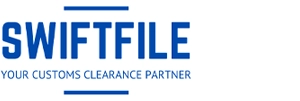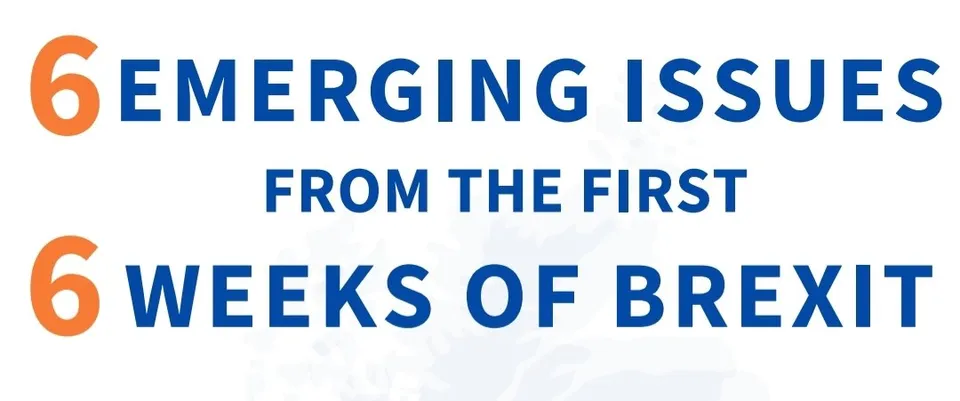2020 SHOULD HAVE BEEN THE YEAR that businesses spent preparing for Brexit. Instead, they were hit with a pandemic and the unprecedented disruption that came with it. Now many CFOs are grappling with hastily put together customs solutions, some of which are not entirely fit for purpose.
In the six weeks since the 1st January 2021, a number of key trends have emerged in how businesses are responding to the re-introduction of customs. Some of these trends indicate significant risks requiring the close attention of CFOs.
These trends raise a number of risks across the key areas of: Compliance; Internal Reporting; Cashflow and Maintaining Profitability / Viability.
1. LACK OF AWARENESS ACROSS A BUSINESS OF THE IMPORTANCE OF BEING CUSTOMS COMPLIANT
Much of the focus of businesses over the past 6 weeks has been on (i) getting goods in and out, and (ii) minimising duty. This is understandable, but companies must be aware of the importance of staying compliant. Even if the filing of customs declarations is outsourced, the trader is responsible for the accuracy of the information submitted. Any errors or under declarations might not be picked up for 3 weeks, 3 months or even 3 years. With fines and penalties, the longer an error goes undetected, the bigger the potential problem. Key Learning: Customs declarations should be treated with the same respect as a tax return
2. LACK OF COMFORT ON THE ACCURACY OF THE CUSTOMS DECLARATIONS BEING FILED
Many freight companies, who are now providing customs clearance services, have underestimated the complexity of what is involved. As a result, some are now overburdened and undertrained. With e-declarations, the right combination of characters in the right boxes will get a green routing. It doesn’t necessarily mean that the declaration filed on behalf of the business is correct. Key Learning: Companies need to take ownership of the customs declarations submitted in their name. They should look for visibility of what is being submitted, and carry out regular audits of declarations filed.
3. CONFUSION OVER THE ENTITLEMENT TO 0% RATES, LEADING TO UNDER PAYMENT OF DUTY
One of the common misconceptions around the EU/UK Trade & Co-Operation Agreement is that it allows duty free access on all goods moving between the two parties. In fact, duty free access applies only to products of EU or UK origin, and it doesn’t happen automatically. An importer must claim for preferential duty rates in their import declaration, and they must be able to prove the qualifying origin of their goods. The most straight forward way of proving origin is to get a Statement on Origin from the supplier (for which, a specific wording is required). Preferential duty rates can be claimed retrospectively for up to 3 years. So if there is a doubt over the ability to prove the origin of the goods, companies should err on the side of caution. Key Learning: A clear understanding of whether a company is entitled to preferential rates is essential. When claiming preferential duty rates, the necessary documents must be in place to prove the origin or the goods.
4. INTERNAL REPORTING ISSUES CAUSED BY DIFFICULTY OBTAINING SHIPMENT AND CUSTOMS INFORMATION
While it may not be best-practice, it is common for companies to have multiple clearance agents submitting declarations on their behalf. This may arise if companies use different freight companies for different parts of their business or different geographical locations. Or it could be that UK suppliers are organising the transport on deliveries to Irish customers. This can present problems in getting the necessary information for internal reporting. This can be a particular issue for businesses with high volumes of transactions. Key Learning: Companies should request visibility from their clearance agents, and put processes in place to ensure they get the information needed to complete their monthly reporting cycle.
5. NON COMPLIANCE WITH IMPORT VAT RULES COULD RESULT IN THE LOSS OF POSTPONED ACCOUNTING
The introduction of Postponed Accounting for import VAT was a massive benefit to businesses bringing goods into Ireland. The alternative could have resulted in significant cashflow difficulties for some. Importers looking to avail of Postponed Accounting must elect to do so in their import declaration, and then account for the import VAT in their normal VAT return. Companies should ensure all import VAT postponed in a period is included on their VAT returns. Failure to comply could lead to exclusion from Postponed Accounting in the future. Key Learning: Processes should be put in place to ensure all Import VAT is correctly reflected in a company’s VAT return.
6. NOT ALL COMPANIES ARE AWARE OF THE BENEFITS OF CUSTOMS SPECIAL PROCEDURES
The return of customs has significantly changed the trading environment between Ireland and Britain. As a result, businesses may be questioning the profitability (or even viability) of certain parts of their business (e.g. low value shipments, returns, warranty shipments). But before making significant decisions, consideration should be given to the various customs special procedures and simplifications that are available. These simplifications have been put in place for customs compliant businesses to save time and money. Customs warehousing and temporary admission are two of the more commonly used procedures, but there are over 20 in total. Whatever the nature of the trading business, it is likely there is a special procedure that could be of benefit.


